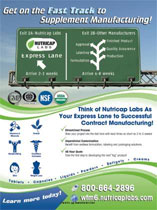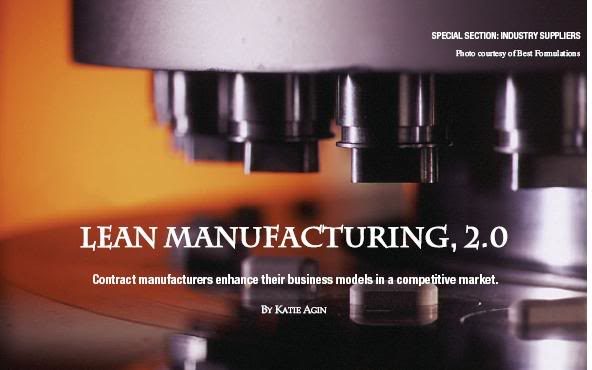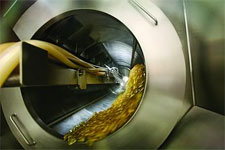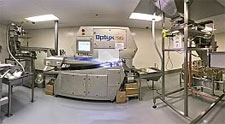Contract manufacturers uphold a major portion of the natural products industry, allowing companies to be innovative and flourish in a variety of market climates. Steve Holtby, president and CEO of Soft Gel Technologies, Inc., Los Angeles, CA, says, "Companies usually seek the services of a contract manufacturer because they want the benefits of having a manufacturing operation without the overhead or the headache."
Over the years, contract manufacturers' business models have evolved and many have adopted the idea of "lean manufacturing." The term, derived mostly from Toyota's well-known lean production practices, means streamlining processes, increasing efficiency, wasting nothing and squeezing whatever possible from every dollar. This philosophy is definitely still relevant, but now, lean is the standard, and contract manufacturers must take extra steps to make sure their businesses stand out.
 Certifiably Good Business
Certifiably Good Business
Throughout manufacturing history, smart companies have layered cumulative business models to create the most efficient and highest quality businesses possible (see Figure 1). Rather than transitioning away from lean practices, manufacturers have enhanced them.
One way companies are doing this is to acquire various certifications for their businesses to meet customer and consumer demands. Certifications have become a driving force for telling retailers which products are quality and letting consumers know which products are safe.
"Certainly the increased responsibility of ingredient identity and assurance of potency and purity in product adds time and money to the production cycle, but, with new U.S. Food and Drug Administration (FDA) current good manufacturing practices (GMP) as required under the Dietary Supplement Health and Education Act (DSHEA), all competitors are on a level playing field, " says Kenn Israel, vice president of marketing for Robinson Pharma of Santa Ana, CA. As a result, additional third-party certifications may be a way for contract manufacturers to break away from the pack.
Eugene Ung, director of marketing for Best Formulations, City of Industry, CA, agrees: "Lean manufacturing is always a good goal for any manufacturing company to pursue—where efficiency is very, very important. However, we still have demand for other certifications such as: sports certification, organic certification, kosher certification, halal certification, etc. … Many of the certifications are seemingly overlapping, so it's not too difficult if you already have the infrastructure. It comes down to a business decision to justify the additional costs in obtaining more certifications. Marketers are always looking for ways to differentiate their products, so there will always be demand for specific certifications."
 Also, while third-party certification has become increasingly coveted, lean manufacturing is still important. Israel says it's a mistake to look at quality and efficiency as opposite poles. Quality and efficiency, he says, are "mutually supportive and empower an organization to become a more effective competitor. Certification, specifically cGMP, HACCP or ISO, is driven by developing, and maintaining a clean, safe and efficient work environment and development and adherence to rigorous standard operating procedures. These same attributes allow a company to manufacture efficiently and accurately."
Also, while third-party certification has become increasingly coveted, lean manufacturing is still important. Israel says it's a mistake to look at quality and efficiency as opposite poles. Quality and efficiency, he says, are "mutually supportive and empower an organization to become a more effective competitor. Certification, specifically cGMP, HACCP or ISO, is driven by developing, and maintaining a clean, safe and efficient work environment and development and adherence to rigorous standard operating procedures. These same attributes allow a company to manufacture efficiently and accurately."
|
Select Third-Party Certifiers |
Certifications are so important that companies dedicate themselves to pay top dollar—costs include fees for registration, audits, certification marks (labeling) and often yearly maintenance fees, which can vary, depending on a company's size. Direct costs for initial certification are usually straight forward and can range from around $10,000-$15,000 each, using NPA and NSF as examples. But, according to one contract manufacturer, with an annual revenue range of about $30–40 million, the cost of the infrastructure to obtain, develop and maintain these certifications can easily cost over a million dollars per year (which includes personnel, training, fees, building/facility infrastructure, laboratory equipment/testing apparatus, etc.). Despite this, lean manufacturing supported by certifications will certainly lead to cost savings, precise manufacturing and consistency.
Shabbir Akand, director of sales and marketing for NHK Laboratories, Inc., Santa Fe Springs, CA, adds, "Our GMP certifications ensure regulatory compliance domestically, and our ISO 9001:2008 registration is an illustration of our commitment to manufacture quality into our products as opposed to simply testing for quality after the fact."
Other increasingly popular certifications include allergen free and gluten free. The recent surge in awareness about gluten in foods has been the impetus for many companies to seek out contract manufacturers with the ability to certify foods and supplements as gluten free. The process of creating gluten-free products, or anything-free products for that matter, can be costly and time consuming. This is why many companies choose to outsource to a contract manufacturer if they don't have the proper facilities to accommodate this need. Especially in such a worrisome economy, contract manufacturers are the answer for companies who cannot afford to add their own facilities or new machinery.
Even though many supplements tend to be inherently gluten free, most companies still view the certification as important for consumers' peace of mind when choosing products. Thus, companies have lately been choosing to be sure products are certified gluten free. Similarly, manufacturers with facilities certified as nut-free may be sought after by companies that do not have the means to certify their own facilities as such.
Religious certifications, too, have been on the rise. "Our organic and religious dietary certifications are part of an ongoing initiative to cater to our clients' needs with regard to competitively marketing their products," says Akand.
The media also has a strong effect on how companies choose to certify. The sports supplement market has been severely scrutinized as a result of certain rogue companies offering products contaminated or spiked with illegal designer steroids and drugs. This past December, the United States Anti-Doping Agency (USADA) announced its "Supplement Safety Now" campaign to urge Congress to create regulations that better police the industry, an initiative that has been supported by NSF's GMP for Sport program. The NPA has also voiced support for USADA's crusade against these bad actors, but issued a warning to be careful not to damage the image of reputable companies and the industry as a whole. Because of this, some companies have chosen to pursue certifications to reinstill confidence in these products. Holtby says, "We have gone an extra step and are certified through NSF's Athletic Banned Substances program, also known as GMP for Sport, which means that our products will not contain any ingredients that might be of concern to professional athletes with regard to drug testing."
Before choosing a contract manufacturer, it may be wise to look through the entire supply chain to see which suppliers also meet specific requirements. For more information on the relationship between suppliers and manufacturers, refer to this month's supplier feature.
Lean and Green
Going green is another way that manufacturers are standing out among the competition. As it turns out, green is the new lean. Sustainability initiatives make business sense and are not, as many might assume, merely a "greenwashing" tactic. For example, green facilities cost about the same to build, but require approximately 30% less to operate and improve employee productivity (1).
The U.S. Department of Commerce defines sustainable manufacturing as "the creation of manufactured products that use processes that minimize negative environmental impacts, conserve energy and natural resources, are safe for employees, communities, and consumers and are economically sound" (2). The implied sense of protection for future generations does not only apply to individuals, but also to businesses.
Jay Kaufman, president of Torrance, CA-based Paragon Laboratories, says, "We see a lot more interest in sustainable crops, the use of water in place of solvents and the use of recycled materials for finished product packages."
Here are some examples of what contract manufacturers in the natural products industry are doing:
-
 Akand says that NHK Labs plans to set up its own re-distillation system to recover used solvents to minimize waste generation.
Akand says that NHK Labs plans to set up its own re-distillation system to recover used solvents to minimize waste generation. - Kaufman of Paragon Laboratories says, "We have placed emphasis on the use of energy-efficient electrical equipment and fixtures and we recycle much in the way of waste products generated from the manufacturing process."
- In May of 2005, Soft Gel Technologies invested in a 260-kilowatt co-generation machine that generates heat and electric power simultaneously from the same source of clean-burning natural gas. This facility upgrade provides the company with an uninterrupted source of power, independent from the California power grid. By providing 80% of their own electricity, the company saves about 660,000 kilowatt-hours of electricity annually. In addition to other lean practices, says Holtby: "As a soft gelatin capsule manufacturer, we have reduced the amount of gelatin left over from each manufacturing run and sell the remnants to other industries so that there is less waste."
- Israel of Robinson Pharma says the company's young facility was constructed based on new technologies to make it more efficient. "Our continuous dry process not only produces a better quality soft gel more rapidly (1/4 the normal time), it does so using less energy. Our central heat plant and water loop systems virtually eliminate the need for electrical induction heating and saves significant energy as well. We have found that being green earns us more green!"
|
Contract Manufacturer Offerings Best Formulations: Best Formulations contract manufactures nutraceuticals in its in-house 120,000 ft2 facility. Offerings include softgels, tablets (including granulation and coating), hard shell capsules, teas, powders, probiotics, bottle filling and powder filling. Recent offerings include the V-Gel vegetarian, non-animal softgels and the Q-Best and highly absorbable CoQ10 softgel. Certifications include: FDA & California Drug License, NPA and NSF GMP Certification, NSF Sports Certification, Organic Certification and Kosher/Halal Certification. |
Lean and NOT Mean
One thing is certain: when lean manufacturing is concerned, great customer service will always be effective in trimming the fat, in the form of hassles, unhappy customers, mistakes and so on. Contract manufacturers do, however, offer varying degrees of involvement with their clients. For example, a company may have a formulation they wish to try out in a product, but can still leave the marketing and advertising design to the contract manufacturer, or vice versa. Depending on a company's needs, prospective partnerships should be researched carefully to find out a company's strengths and weaknesses and levels of involvement.
For the most part, says Akand, "We partner with our clients—they are responsible for the marketing and sale of a product, and we assume the responsibility of ensuring products safety, efficacy and quality." He continues, "Our clients are not only customers, they are our business partners. If our clients are successful, we will invariably be successful as well. That is why our customer service and technical affairs team work extremely closely with our clients on issues ranging from formulation to product labeling and marketing collateral."
 Kaufman also advocates working closely with clients. He says, "We're not shy about making suggestions that we believe might avoid potential problems or will improve the product. This close relationship helps our clients by making their jobs easier and giving them greater confidence."
Kaufman also advocates working closely with clients. He says, "We're not shy about making suggestions that we believe might avoid potential problems or will improve the product. This close relationship helps our clients by making their jobs easier and giving them greater confidence."
Other companies focus more on their strengths as formulators. Holtby says, "We often give suggestions or advice on improving a formulation, should the customer request our opinion. For instance, there are situations in which soft gels are not an optimal format. In some cases, there may be space limitations for the formula (getting ample quantities of protein, for example) or interactions between raw materials (such as the effect of very low pH on a gelatin shell). Thus, it is important to consider both the physical and chemical properties of a formula. However, we do have to keep in mind that customers own their custom formulations, and they have often performed their own research in creating the formulation."
When it comes to marketing products, some companies are highly involved, while others leave more freedoms to clients. Provenzano says Nutricap Labs "will provide formula recommendations when solicited. We are able to state the rules and regulations governing the industry. However, we will not take responsibility for marketing/advertising/promotional materials/statements made by our clients. We strongly recommend seeking legal counseling on these issues."
|
What To Expect in 2010
Companies are always trying to differentiate their products, says Eugene Ung of City of Industry, CA-based Best Formulations. He identifies three of the most prevalent trends in product development: 1) Using new ingredients, 2) Combining ingredients to make a unique or exotic formulation and 3) Formulations that help improve the absorption of the ingredients. |
As a whole, the natural products industry has been thriving as Americans are turning away from expensive pharmaceuticals and embracing preventative, natural healthcare in the form of supplements and food. Holtby says, "When the economic situation is tough, it is more important than ever for people to remain healthy, so we are not surprised with the current situation and its effect on us."
Most agree that the economy over the past several years has been a boon to the contract manufacturing industry, specifically. Akand says, "Historically, the contract manufacturing industry typically experiences growth in economic downturns. The recession of 2007 is certainly not an exception. Recessions are great opportunities to honestly reevaluate a firm's core competency. In economic contractions, many marketing firms that manufacture products themselves realize that the variable costs (e.g., goods, insurance, labor, etc.), the changing regulatory climate and the huge capital expenditure required to manufacture products internally is not the best use of financial capital. Such firms then turn to contract manufacturers such as ourselves."
Holtby adds, "It is a big decision for a dietary supplement company to manufacture its own products or subcontract with an outside vendor. Increasing costs and a lack of manufacturing acumen may be a couple of the variables that drive the decision to utilize a contract manufacturer."
Contract manufacturers can offer services that would otherwise be extremely costly to clients. For example, says Provenzano, "We have an in-house microbiology laboratory and an analytical laboratory. In-house laboratories help ensure quality while keeping pricing competitive."
Companies may also be hesitant to launch new product lines that have unsure futures in the market. Some contract manufacturers can offer small batches or test runs of products to see how they will fare. Ung says, "We've seen a cessation with research and development and new product development. It appears that many companies are not taking chances with launching new products given the uncertain economic climate, so we've seen new product development grind almost to a standstill.
"Perhaps what companies are doing," Ung continues, "is to review their product offerings and really analyze which products actually bring in profits for the company vs. the dogs. With such analysis, companies can really focus their resources on the breadwinners for the company. For a client with a tight budget, we advise to keep the formulation simple. When you get into really complex formulas with many, many ingredients, it increases the chances of something going wrong with the formula, and with so many ingredients, it's challenging to pinpoint the problem."
|
Well-Oiled Machines
|
The economic situation has even spurred some new partnerships. Says Israel, "Our newest partnership with US-Bulk Nutrition allows clients to get the most important nutritional products as ready-to-package bulk in single-case quantities and we maintain an inventory so there is no wait time. This new business allows clients to minimize commitment and lead time while paying approximately 20% less than comparable U.S.-made items of similar quality." WF
References
- M. Willard, "Sustainability & The Natural Step," presentation at Lean to Green Manufacturing Conference, Portland, OR, Oct. 27–29 2008.
- International Trade Administration, U.S. Department of Commerce, www.trade.gov/competitiveness/sustainablemanufacturing/how_doc_defines_SM.aspi, accessed Dec. 4, 2009.
Published in WholeFoods Magazine, Jan. 2010












